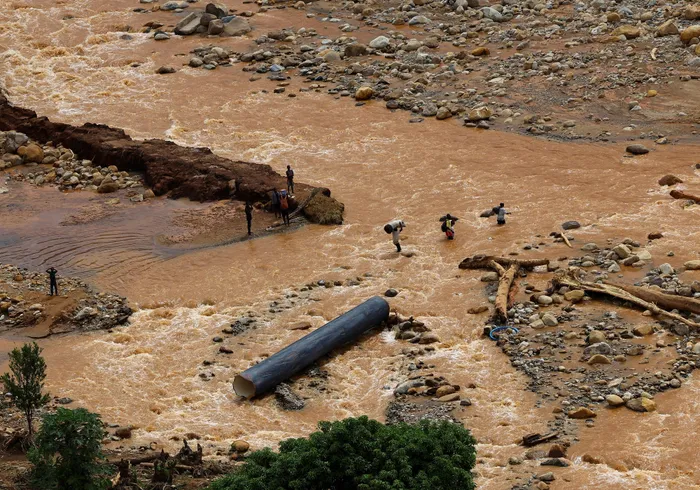SADC’s poor support for Malawi raises questions

Picture: REUTERS People cross a flooded area in Muloza, Malawi, on March 18, 2023, in the aftermath of Tropical Cyclone Freddy. The SADC disaster unit’s response and support following the natural disaster in Malawi pales in comparison to that of the UN, says the writer.
By Gwinyai Taruvinga and Ratidzo Makombe
Cyclone Freddy ravaged much of Malawi, leaving many casualties and the destruction of property in the southern African country.
This devastation has again brought to the fore the need for strong mechanisms through regional bodies such as the Southern African Development Community (SADC).
When SADC was formed in August 1992, the organisation was meant to provide socio-economic, political and security co-operation. SADC had institutions such as the Organ on Politics, Defence, and Security as one of its key institutions dedicated to contributing to political stability within the region.
Presently, SADC endeavours to achieve economic development, peace and security, economic growth, and the alleviation of poverty in the region.
When Freddy struck Malawi many in Africa bemoaned the lack of support from SADC as a body. Opposition leader in Zimbabwe, Nelson Chamisa, was one of the many individuals who called for the organisation to take action to assist Malawi.
SADC has a Disaster Risk Reduction Unit that is meant to address cases such as Freddy in Malawi. The unit is primarily responsible for the co-ordination of regional preparedness and response programmes for transboundary hazards and disasters.
The Disaster Risk Reduction Unit acknowledges that the Southern African region has been prone to several natural disasters such as Cyclone Eline, which ravaged Mozambique and Zimbabwe in the early 2000s.
With the mechanism in place, it is surprising that SADC’s efforts have not been visible in Malawi since the onset of the disaster. Countries such as Tanzania and Zambia have provided helicopters for relief efforts but SADC, as a body, has been lacking in its efforts.
Other than providing $300 000 (R5.5 million) to Malawi for humanitarian assistance, the regional body has not provided much else. The SADC response to Cyclone Freddy in Malawi pales in comparison to the EU’s response to the earthquake that struck Turkey. Instead, with Malawi, external bodies, such as the UN, have given assurances that they would provide support.
Malawi’s Department of Disaster Management Affairs noted that more than 40,000 households were affected, with many residing in temporary camps further showing the scale of the damage that was caused by the cyclone.
It is believed that the equivalent of six months of rain was recorded in six days. Villages and towns were flooded, and crop fields were decimated, affecting the livelihoods of several citizens. Districts such as Chiladzulu and Nsanje reported widescale damage, with villages being washed away.
Many Malawian citizens bemoaned the poor response from the government. Social media was awash with pleas for assistance for the affected communities. The military was criticised for a poor response to the cyclone.
These are signs of a government that has failed to deal with a disaster of mammoth proportions. President Lazarus Chakwera alluded to how the level of devastation in the country was far greater than the resources the country has at its disposal, thus making a strong case for regional bodies like SADC to come to the fore.
The Malawian case speaks to the broader challenges that the Continent faces concerning climate change. Extreme temperatures and floods have affected the Continent and it will probably experience more extreme weather events in the coming years.
SADC, through its Climate Change Strategy and Action Plan, has sought to mitigate the challenges that have been laid bare due to climate change. According to the plan, SADC’s ultimate objective is to stabilise greenhouse gas concentrations and promote sustainable economic growth in ways that foster social equity.
SADC also acknowledges that climate change is a multidisciplinary and cross-cutting issue and therefore any strategy that is implemented must consider this. This element becomes important, especially within the context of the Malawian case where the impacts of climate change had ripple effects stretching to the safety of citizens and food security in the country.
The flooding in Malawi has also contributed greatly to an outbreak of cholera in the country, further alluding to the ripple effects of a natural disaster of this magnitude. As of April 7, 2023, it was reported that more than 900,000 citizens need water and sanitation, with the most affected being women and children.
Freddy’s rain and the ensuing floods resulted in facilities being washed away, boreholes being submerged under water, and water resources being compromised contributing to the likelihood of other waterborne diseases spreading.
Worryingly, diseases like cholera can easily spread to bordering countries as was the case in Zimbabwe’s cholera crisis in 2008 which affected neighbouring countries. Freddy, although affecting Malawi more than other African countries, showed the impacts of climate change on the Continent and, more importantly, sheds light on the importance of having mitigating measures in places from a regional perspective.
Regional bodies, like SADC, have an important role in assisting member countries in the event of natural disasters.
Taruvinga is a postdoctoral research fellow at the Wits Humanities Graduate Centre and Makombe is a doctoral candidate in development studies and a researcher at the University of Johannesburg’s Institute for Pan-African Thought and Conversation.